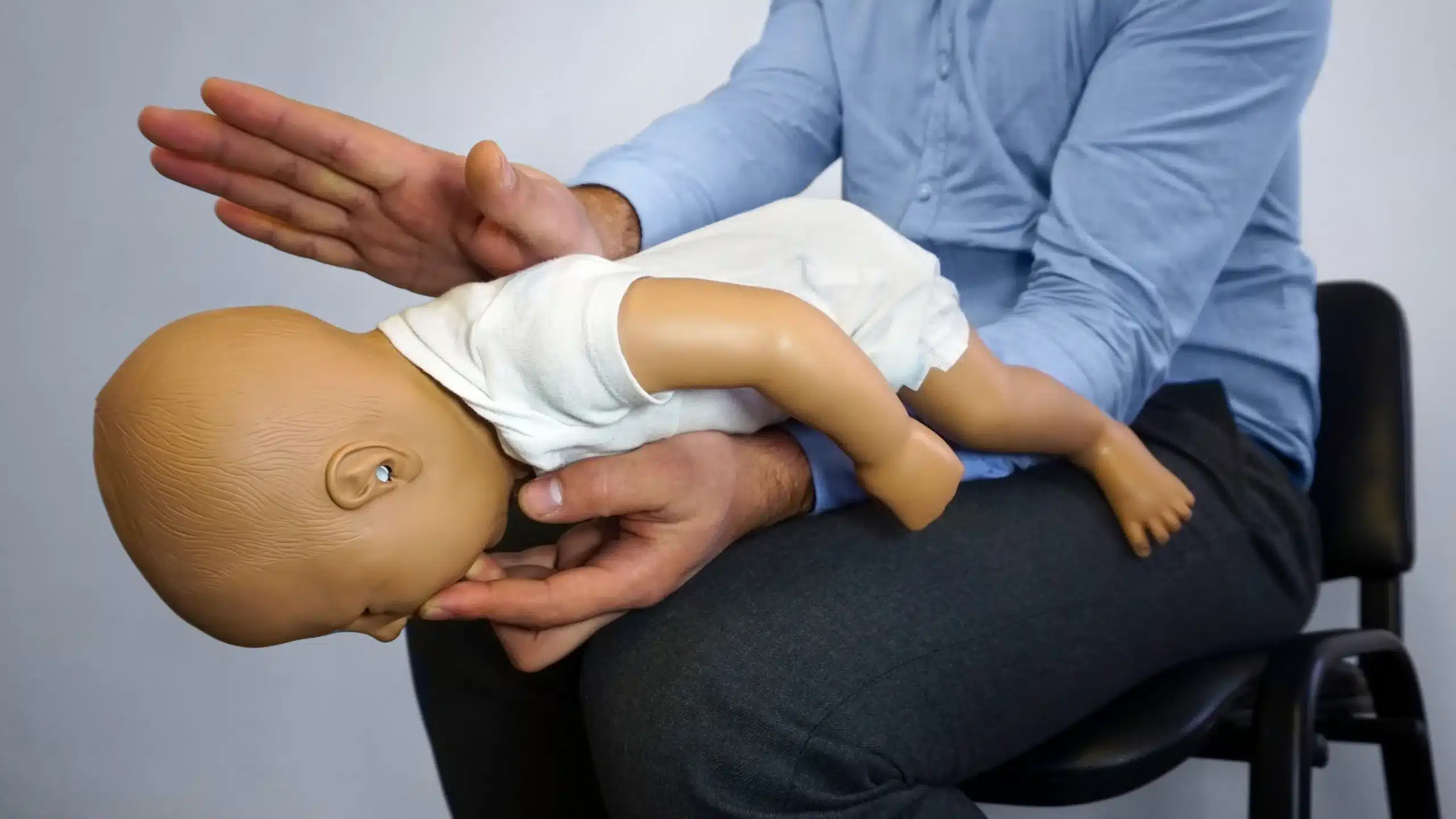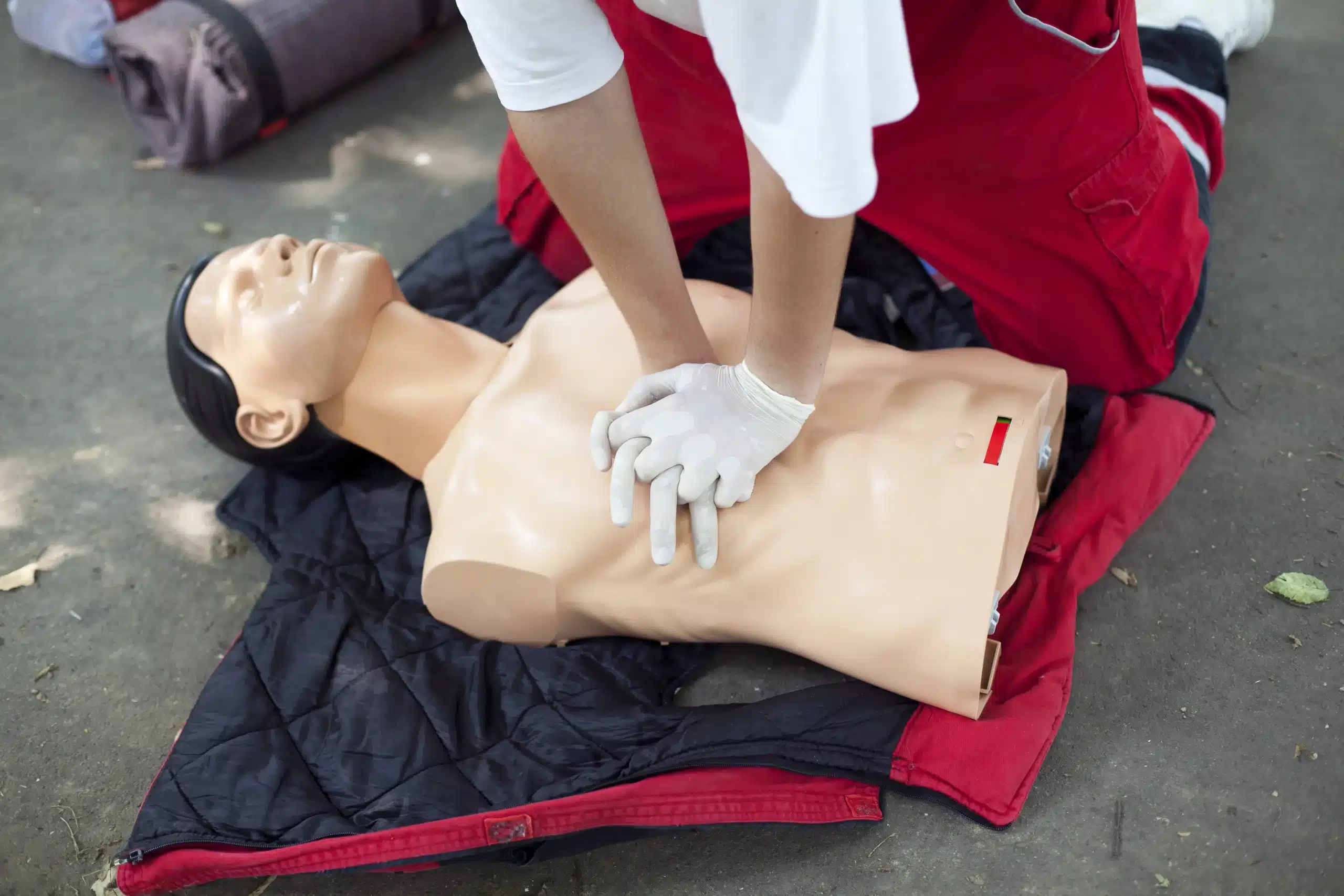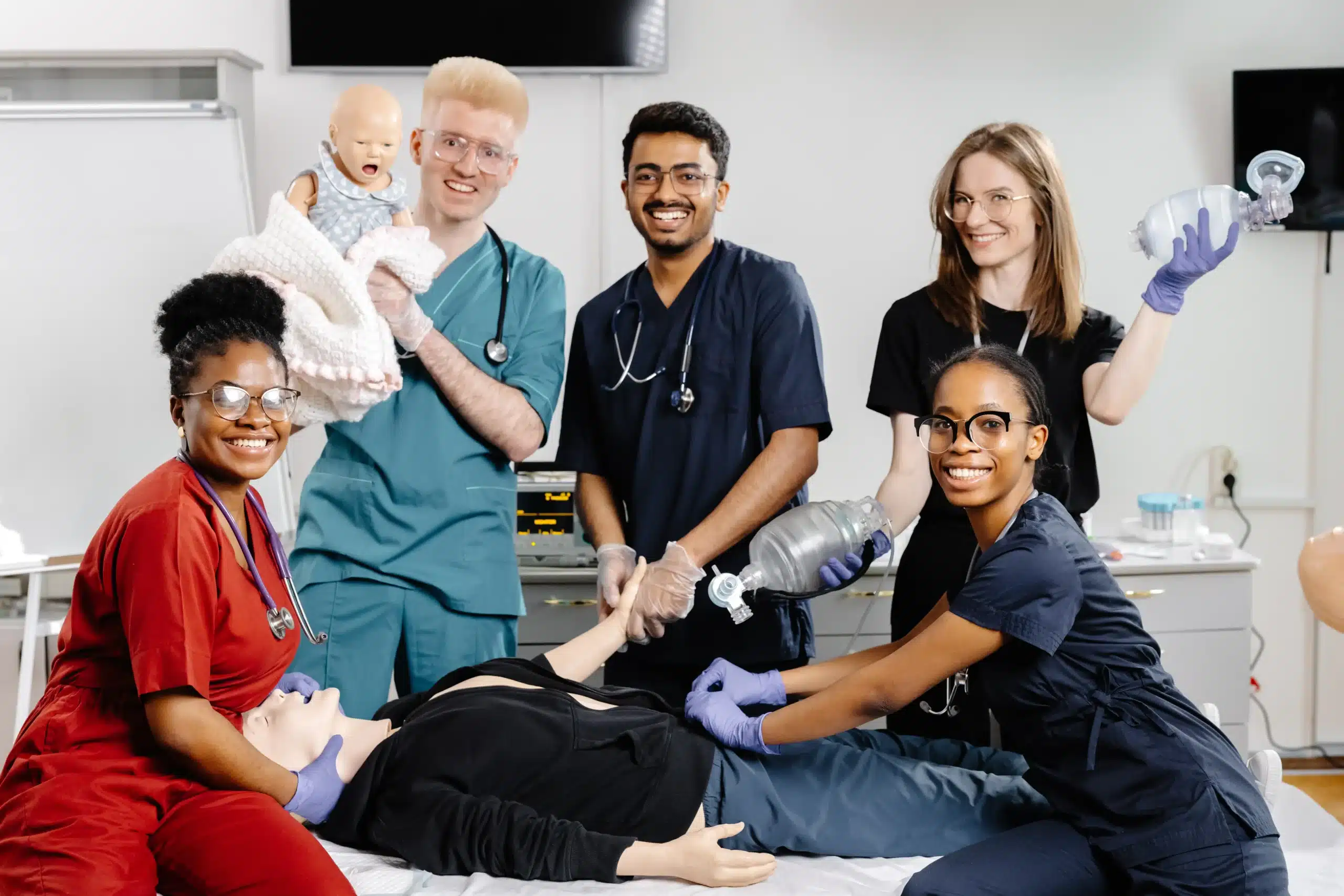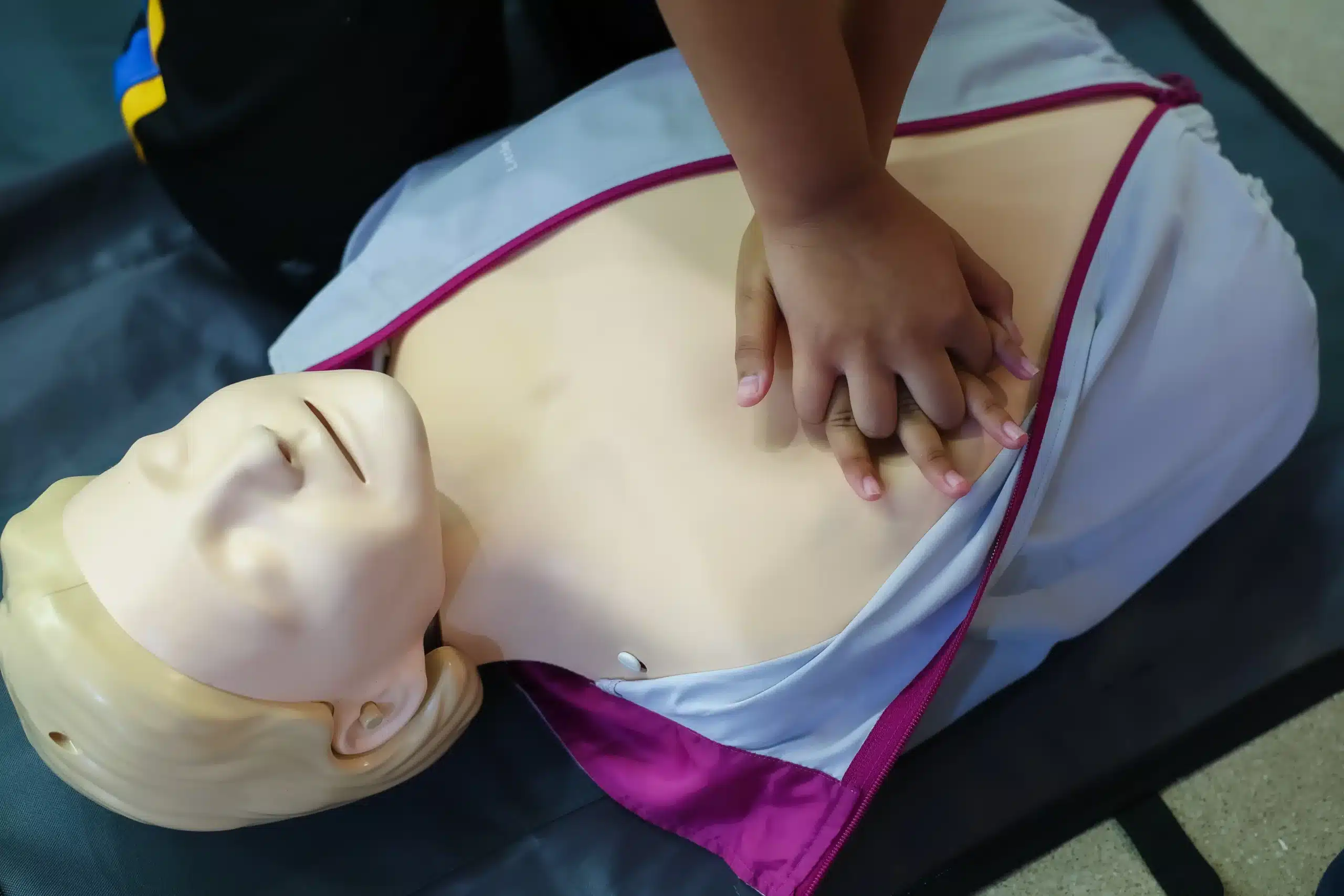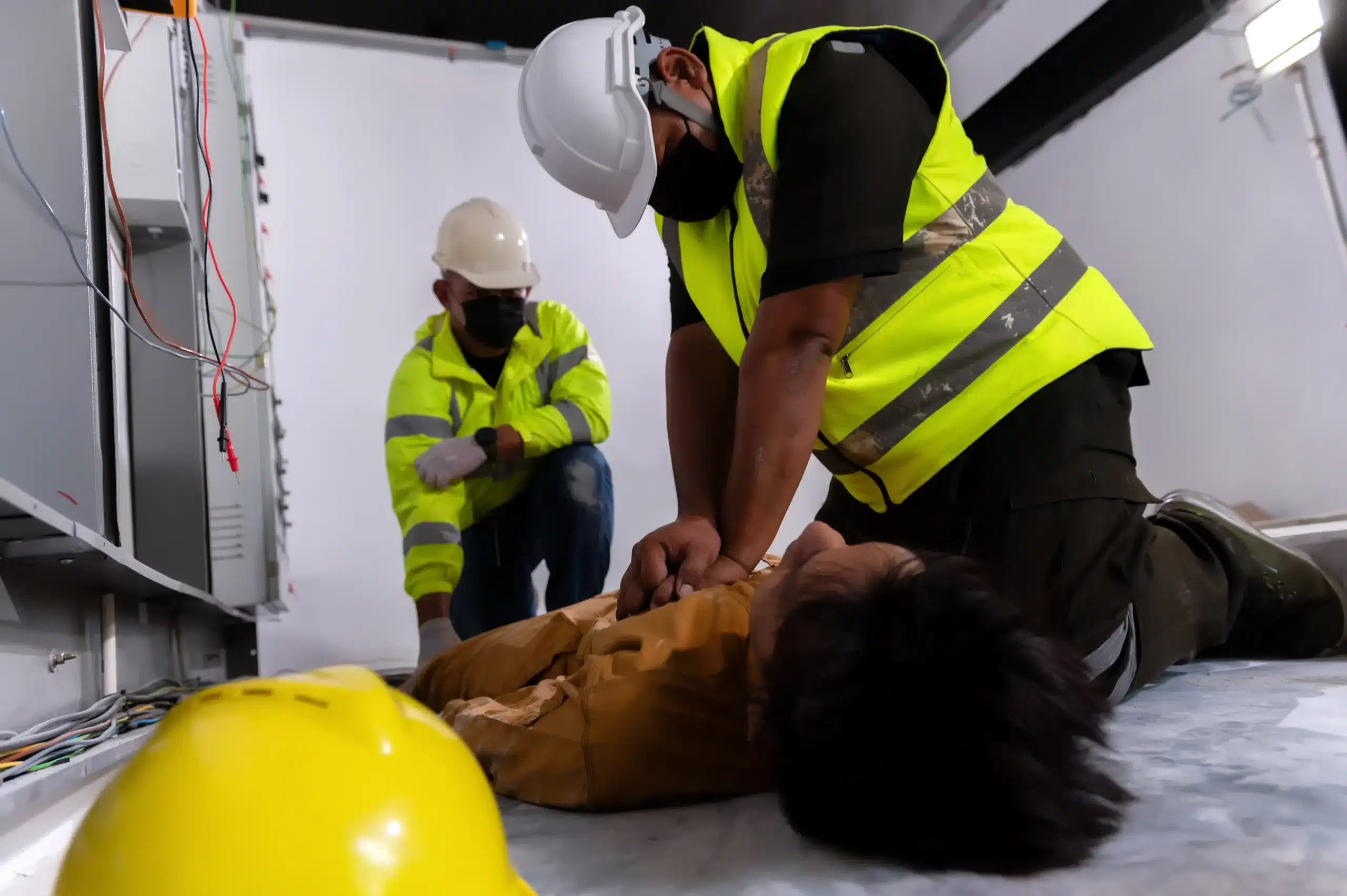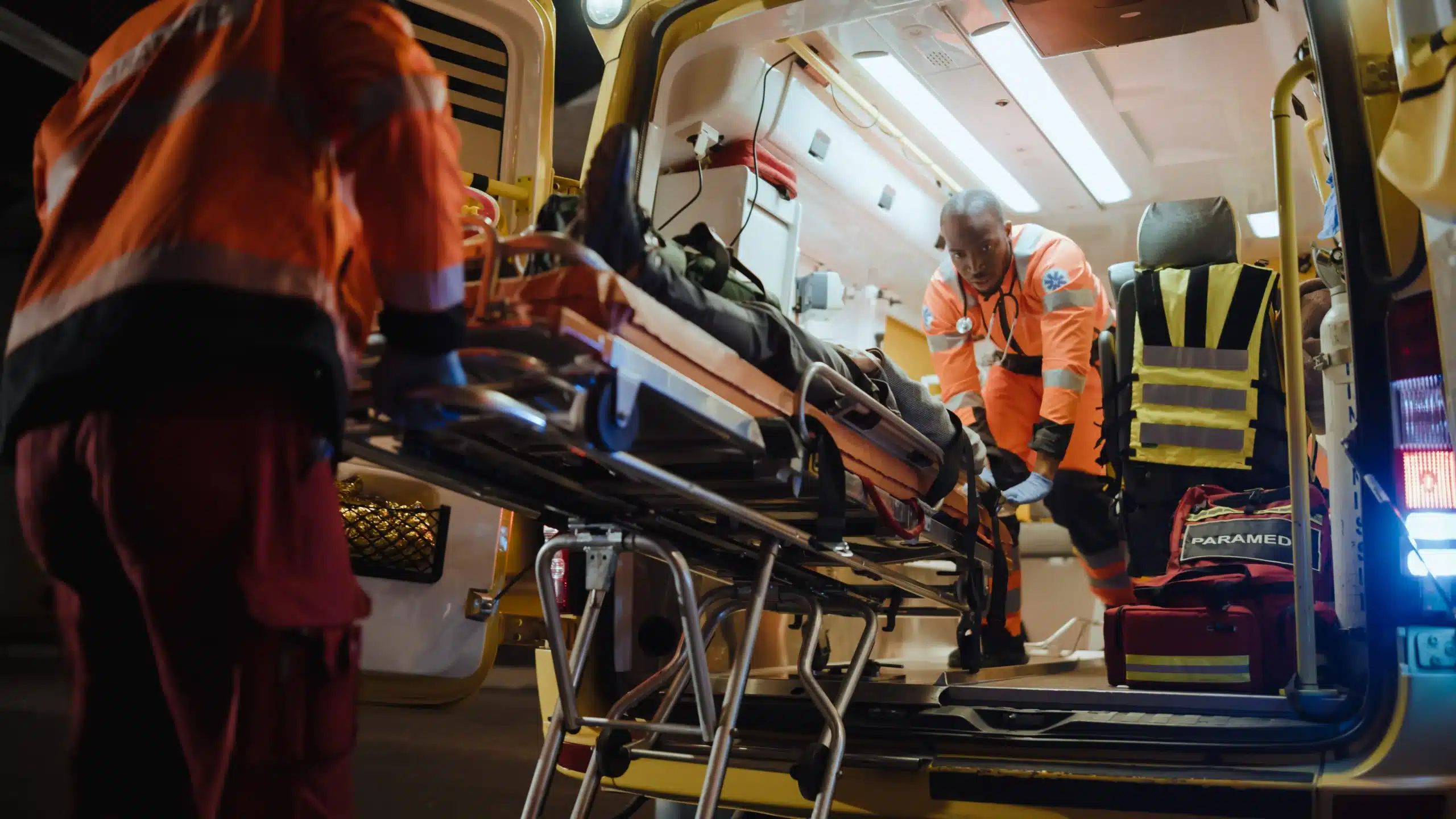Emergencies can happen anytime, anywhere. Being equipped with life-saving skills like CPR and first aid can make all the difference. If you’ve been searching for “CPR and First-aid certification courses near me in Visalia,” this guide is your one-stop resource. We’ll explore the different types of certifications available, from basic CPR to advanced life support, and help you choose the right course for your needs. Whether you’re a healthcare professional, childcare provider, or simply a concerned citizen, we’ll guide you through the process of finding the perfect training program in Visalia, Tulare, or Delano, California. We’ll also discuss the importance of instructor qualifications, course formats, and what to expect during your training.
Key Takeaways
- CPR and First Aid skills empower you to handle emergencies: While distinct—CPR addresses life-threatening breathing emergencies, and First Aid covers a broader spectrum of injuries—both equip you with practical skills to make a real difference. Staying current with certifications ensures you can provide effective, up-to-date care.
- Visalia offers accessible and affordable training options: With various providers, schedules, and formats, finding a course that fits your needs is easy. Prioritize AHA-certified instructors with practical experience and compare pricing to find the best value.
- Maintaining your skills is crucial for confident responses: Regularly renew your certifications and consider refresher courses to stay proficient in the latest techniques. Keeping up with evolving guidelines ensures you’re always prepared to handle emergencies effectively.
What are CPR and First Aid Certifications?
CPR and First Aid certifications equip you with life-saving skills, but they address different situations. A CPR certification focuses on cardiopulmonary resuscitation—the techniques used when someone has stopped breathing and doesn’t have a pulse. You’ll learn chest compressions and rescue breaths—essential skills for responding to cardiac arrest and other breathing emergencies. First Aid certification covers a broader range of medical emergencies, such as treating wounds, burns, and fractures, and managing choking incidents. It prepares you to offer immediate assistance until professional medical help arrives. Both certifications require training through a certified instructor and usually involve hands-on practice and testing. Organizations like the American Heart Association regularly update their guidelines, so staying current with the latest techniques is essential. While distinct, both CPR and First Aid certifications empower you to handle emergencies confidently and potentially save lives.
Why Get Certified in Visalia?
Getting certified in CPR and first aid isn’t just a formality; it’s about empowering yourself with skills that can save lives. In Visalia, the need for certified individuals is especially important given the city’s growth and the range of professions requiring these skills. Whether you’re in healthcare, childcare, or simply a concerned resident, a current certification can make a real difference. CPR training is crucial in emergencies, and having these skills can significantly improve outcomes.
Beyond the immediate impact, these certifications can open doors to career opportunities. Many healthcare jobs require these certifications, both in and out of hospitals. The College of the Sequoias, for instance, offers BLS CPR classes leading to American Heart Association certification—a valuable asset for healthcare careers. Even outside of medicine, these certifications enhance your resume and show your commitment to safety. This can be a plus for roles in education, childcare, fitness, and other community-focused fields.
Visalia offers convenient options for getting certified. Several providers offer mobile training, bringing the instruction to you and making it easier to fit these courses into your schedule. Remember that CPR guidelines are updated regularly. Staying current ensures you can provide the most effective care. Refresher courses are key to maintaining proficiency and confidence in emergencies.
Top CPR and First Aid Certification Providers in Visalia
Finding the right CPR and first-aid certification course can feel overwhelming. To simplify your search, I’ve compiled a list of reputable providers in Visalia. Remember to verify course details and schedules directly with each provider, as information can change.
Safety Training Seminars
Safety Training Seminars offers a comprehensive selection of American Heart Association courses, including BLS, ACLS, PALS, CPR, and First Aid. They also offer NRP and EMSA Health & Safety training for childcare providers. Committed to excellent customer service and the lowest prices in Tulare County, they offer daily classes and certifications valid for two years. Visit their website for more information, including their low price guarantee. You can also contact them directly with questions or explore their BLS course schedule.
Visalia CPR
Visalia CPR focuses on mobile CPR and first aid training. As an authorized American Heart Association training center, they offer various courses, including Basic Life Support (BLS), Heartsaver CPR AED, and First Aid. Learn more about their course offerings.
Southern’s CPR & First Aid Training
Southern’s CPR & First Aid Training provides a range of American Heart Association-certified first aid and CPR courses. Their programs help participants develop essential, life-saving skills. Visit their website for details.
College of Sequoias
The College of Sequoias offers Basic Life Support (BLS) CPR classes that grant American Heart Association certification. This is a valuable credential for many healthcare positions. Explore their program details on their website.
Bentley’s Heartsaver
Bentley’s Heartsaver provides CPR and First Aid training in Visalia and surrounding areas. They offer BLS, CPR, AED, and First Aid certification courses. Visit their website for more information.
Available Course Types and Certifications
Safety Training Seminars in Visalia offers a comprehensive range of courses to equip you with the lifesaving skills you need. Whether you’re a healthcare professional, childcare provider, or simply want to be prepared for emergencies, we have a course for you. Here’s a rundown of our certifications:
Basic Life Support (BLS)
The BLS certification course covers core CPR skills for healthcare providers and other professionals who need to respond to cardiac and breathing emergencies. It emphasizes early CPR, high-quality chest compressions, and teamwork. This course is essential for anyone working in healthcare. You’ll learn how to recognize life-threatening emergencies, provide basic airway management, and use an AED.
Advanced Cardiac Life Support (ACLS)
ACLS is an advanced course designed for healthcare professionals involved in managing cardiopulmonary arrest and other cardiovascular emergencies. It builds upon the foundation of BLS, adding advanced airway management techniques, pharmacology, and team dynamics. This certification is crucial for doctors, nurses, paramedics, and other healthcare providers who may lead or participate in resuscitation efforts.
Pediatric Advanced Life Support (PALS)
The PALS course focuses on the specialized approach required for pediatric emergencies. It teaches healthcare providers how to recognize and respond to life-threatening situations in infants and children. PALS covers everything from respiratory distress and shock to cardiac arrest, providing the knowledge and skills to deliver effective care in these critical moments.
First Aid
Our First Aid certification provides essential training in responding to various injuries and illnesses. You’ll learn how to manage bleeding, burns, fractures, and other common medical emergencies until professional help arrives. This course is beneficial for anyone, from parents and teachers to workplace safety officers and community members. For more information about our First Aid training and other courses, visit our contact page.
Neonatal Resuscitation Program (NRP)
The NRP course is specifically designed for healthcare professionals who care for newborns immediately after delivery. It covers the essential steps of neonatal resuscitation, including airway management, chest compressions, and medication administration. This specialized training is vital for ensuring the best possible outcomes for newborns in need of critical care.
EMSA Health & Safety Training for Childcare Providers
This specialized program meets California’s requirements for childcare providers, covering CPR, First Aid, and emergency preparedness. It focuses on the unique needs of infants and children in a childcare setting, equipping providers with the skills to respond effectively to various emergencies. This training helps create a safer environment for children in daycare centers and other childcare facilities. You can find more details about our available courses and register for a class on our BLS course page.
What to Expect in a Course
Knowing what to expect can help you feel prepared and confident going into your CPR or first-aid training. Here’s a glimpse at what a typical course in Visalia covers:
Course Duration and Format
CPR and first-aid courses in Visalia are designed to fit your schedule. Classes are available seven days a week, offering flexibility for busy professionals, parents, and students. Safety Training Seminars offer courses in both English and Spanish, catering to the diverse community.
Skills Taught
These courses equip you with essential, life-saving skills. You’ll learn to recognize the signs of a medical emergency, perform CPR on adults, children, and infants, and administer first aid for various injuries, such as burns, cuts, and choking. The curriculum emphasizes the importance of CPR training, especially for family members and those in workplaces. Southern’s CPR & First Aid Training provides comprehensive instruction in basic life support, a crucial skill set for responding to heart failure emergencies.
Certification Process
Upon successful completion of your chosen course, including the skills assessment and written exam, you’ll receive certification. For example, the College of the Sequoias offers American Heart Association certification upon completion of their HLTH 406 course. This certification is often a requirement for many healthcare and other related professions.
Hands-on Practice and Scenarios
CPR and first-aid courses aren’t just lectures. Expect hands-on practice using mannequins and other training equipment. You’ll work through realistic scenarios to build muscle memory and confidence. Visalia CPR Classes incorporates real-time audio and visual feedback during these practice sessions, allowing you to track your performance and refine your technique.
Real-Time Feedback
The use of real-time feedback enhances the learning process. As you practice, you’ll receive immediate feedback on your compressions, rescue breaths, and overall performance. This technology helps you identify areas for improvement and ensures you’re mastering the correct techniques.
Course Costs and Pricing in Visalia
CPR certification class costs in Visalia vary based on several factors. The type of class (adult-only, child/infant, all-inclusive), class format (online, in-person, hybrid), and the level of certification all influence the final price. Knowing these factors will help you compare CPR class costs and find the best fit for your needs and budget. For residents of Visalia, Tulare, and Delano, finding a convenient and affordable option is easier than ever.
Base Pricing
Expect base prices to differ between providers and course types. Basic CPR and First Aid courses typically start at a lower price point than more advanced certifications like ACLS or PALS. It’s always a good idea to check directly with the training provider, like Safety Training Seminars, for the most up-to-date pricing information.
Additional Fees
Be aware of potential additional fees. Some providers charge extra for items like textbooks or same-day certification cards. Inquire about these potential costs upfront to avoid surprises.
Discounts and Payment Options
Many training centers offer discounts for groups, students, or returning customers. Check if discounts are available when registering multiple people or taking several courses. Flexible payment options can also make training more accessible.
Low Price Guarantee
Safety Training Seminars offers a Low Price Guarantee, ensuring you receive competitive rates for quality training. If you find a lower advertised price for a comparable course, they will match it. This guarantee provides peace of mind, knowing you’re investing wisely in your training. Contact Safety Training Seminars to learn more about their commitment to providing affordable, high-quality training in Visalia.
Instructor Qualifications and Experience
When your health is on the line, you want to know you’re in good hands. Choosing a CPR class with qualified instructors is just as important as the certification itself. Here’s what to look for in a CPR instructor’s credentials:
AHA Certification
The American Heart Association (AHA) sets the standard for CPR and first-aid training. AHA-certified instructors undergo rigorous training, ensuring they have the knowledge and skills to teach these life-saving techniques effectively. They must find an AHA Training Center and complete the required instructor certification courses. This process equips instructors with the expertise to deliver high-quality training and prepare students to respond confidently in emergencies. At Safety Training Seminars, our instructors maintain their AHA certifications to provide you with the most up-to-date and reliable training. You can find our upcoming BLS courses in Visalia on our website.
EMS Background
Instructors with experience in Emergency Medical Services (EMS) bring a wealth of practical knowledge to the classroom. Their real-world experience enhances their teaching, allowing them to share valuable insights and prepare students for diverse emergency situations. Many EMS professionals complete the HSI Instructor Development Course (IDC), qualifying them to certify others in CPR, AED use, and First Aid. This background ensures they can provide comprehensive and practical training. Our commitment to providing experienced instructors is part of our Low Price Guarantee.
Teaching Expertise
Effective CPR instruction requires more than just technical knowledge—it demands excellent teaching skills. Qualified instructors create engaging learning environments that cater to different learning styles. For example, instructors teaching National Safety Council (NSC) CPR courses must adhere to specific guidelines, including teaching both CPR and AED components. This ensures students receive well-rounded training and are prepared to handle real-world emergencies. Look for programs that prioritize instructors with proven teaching experience and a passion for sharing their knowledge. You can learn more about our instructors and their qualifications by contacting us directly.
Bilingual Instruction
Visalia is a diverse community, and access to vital training should reflect that. Many CPR and First Aid courses are offered in both English and Spanish, making these essential skills accessible to a broader audience. Bilingual instruction ensures that language barriers don’t prevent individuals from learning how to save lives. At Safety Training Seminars, we’re proud to offer bilingual instruction to serve our community’s diverse needs. We also offer specialized courses like our RQI classes for healthcare professionals.
Course Formats and Scheduling
Finding a CPR and first-aid course that fits your schedule shouldn’t be a struggle. Luckily, there are tons of options in Visalia, from traditional in-person classes to online learning and even mobile training brought right to your doorstep. Let’s break down the different formats so you can find what works best for you.
In-Person Classes
For those who thrive in a hands-on learning environment, in-person classes offer a structured and interactive experience. These classes usually take place at designated training centers, providing a dedicated space for learning and practicing essential lifesaving skills. You’ll have the opportunity to interact directly with instructors, ask questions, and engage in realistic scenarios with other students. Safety Training Seminars, for example, is an authorized American Heart Association training center offering in-person courses.
Online and Hybrid Options
Online courses offer a flexible alternative for those with busy schedules or limited access to physical locations. Visalia CPR offers online classes that allow you to learn at your own pace, completing the coursework from anywhere you have internet access. Some providers may also offer hybrid options, combining online learning with in-person skills sessions, giving you the best of both worlds.
Mobile Training
If you have a group to train, mobile training can be a convenient and cost-effective solution. With mobile training, the certified instructors come to you. Whether it’s at your workplace, community center, or even your home, an instructor can deliver the same high-quality training in a familiar setting. This option is particularly popular for businesses, organizations, and groups of friends or family members who want to learn together.
Refresher Courses
Staying up-to-date on the latest CPR and first-aid guidelines is crucial for providing effective care. Refresher courses are designed to reinforce your existing knowledge and introduce any updated protocols or techniques. These courses are shorter than initial certification courses and offer a valuable opportunity to practice your skills and maintain your confidence in emergency situations.
Choose the Right Course
Deciding on the right CPR and first-aid course can feel overwhelming with so many options. But by focusing on a few key factors, you can find the perfect fit for your specific needs.
Consider Your Needs
First, think about why you’re getting certified. Are you pursuing a healthcare career? If so, a comprehensive course like BLS is essential, and you might also need ACLS or PALS later on. Or are you a parent, teacher, or coach wanting to be prepared for emergencies? A basic CPR and first-aid course might be all you need. Consider your current role and future goals when making your decision. It’s always a good idea to choose a program that emphasizes critical thinking and scenario-based training, so you’ll feel confident adapting your skills to any situation.
Check Certification Requirements
Certain professions require specific certifications. Before signing up for a course, double-check the requirements for your job or desired career path. For example, many healthcare jobs mandate CPR certification, so ensure the course you choose aligns with those standards. If you’re unsure, reach out to your employer or professional organization for clarification.
Evaluate Schedules and Formats
Life gets busy, so finding a course that meshes with your schedule is important. Look for providers that offer flexible scheduling, including weekday and weekend classes, and various course formats. Think about whether you prefer in-person instruction, online learning, or a blended approach. Some providers even offer mobile training, bringing the course directly to your workplace or community group.
Assess Language Preferences
If you’re more comfortable learning in a language other than English, check if the provider offers courses in your preferred language. For instance, some providers in Visalia offer courses in both English and Spanish, making training accessible to a broader audience. Don’t hesitate to contact the provider directly to inquire about language options and other accommodations.
Maintain Your Certification
Earning your CPR and First Aid certifications is a significant achievement, but staying current is equally important. Knowing the renewal process, pursuing continuing education, and keeping up with the latest guidelines will ensure you’re always prepared to respond confidently and effectively in an emergency.
Renewal Process
CPR and First Aid certifications are typically valid for two years. Check your certification card for the specific expiration date. To avoid a lapse in your credentials, renew your certification before it expires. This usually involves taking a renewal course that covers the most current guidelines and techniques. Registering for a renewal course a few weeks before your certification expires is a good way to stay ahead of the game.
Continuing Education
Even if your certification isn’t up for renewal yet, consider taking refresher courses. These courses reinforce your skills and introduce you to any updated procedures, ensuring you’re always ready to respond effectively. Plus, staying active in your training shows your commitment to providing high-quality care.
Stay Updated on Guidelines
CPR guidelines are periodically reviewed and updated to reflect advances in research and best practices. Staying informed about these changes is essential for maintaining the highest standard of care. Resources like the American Heart Association website offer valuable information on current guidelines and updates to CPR techniques. Subscribing to relevant newsletters or following reputable organizations on social media can also help you stay informed and ensure your skills align with the most effective methods.
Related Articles
- CPR Renewal in Visalia: Your Complete Guide – Visalia CPR Classes
- CPR Training in Visalia: Your Complete Guide – Visalia CPR Classes
- Find First-Aid Classes Near Me: Your Practical Guide – Visalia CPR Classes
- CPR Certification Near Me: A Complete Guide – Visalia CPR Classes
- CPR Courses in Visalia: Your Complete Guide – Visalia CPR Classes
Frequently Asked Questions
How long are CPR and First Aid certifications valid? CPR and First Aid certifications are typically valid for two years. It’s essential to renew your certification before it expires to maintain your credentials and ensure you’re up-to-date on the latest guidelines.
What’s the difference between CPR and First Aid? CPR focuses on restoring breathing and circulation when someone’s heart has stopped, while First Aid addresses a wider range of injuries and illnesses, like burns, cuts, and choking. Both are valuable skills to have in an emergency.
What if I can’t make it to a scheduled class? Many providers offer flexible options, such as online courses, hybrid formats (combining online learning with in-person skills sessions), and mobile training, where the instructor comes to your location. This allows you to choose the format and schedule that best suits your needs.
How do I choose the right CPR and First Aid course for me? Consider your reasons for getting certified (career requirements, personal preparedness, etc.), check specific certification requirements for your profession, evaluate course schedules and formats, and consider language preferences. Contacting providers directly can help clarify any questions you have.
Why is it important to stay updated on CPR guidelines even after getting certified? CPR guidelines are periodically updated to reflect the latest research and best practices. Staying current ensures you’re providing the most effective care possible in an emergency. Refresher courses and reliable resources like the American Heart Association website can help you stay informed.
